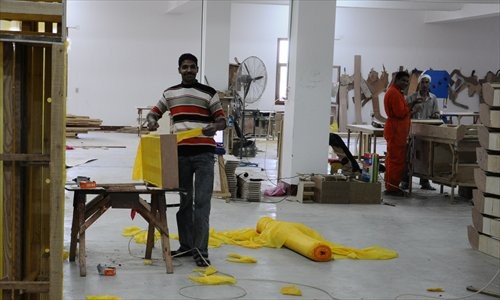For many Chinese companies that have used Egypt as the base for their expansion in northern Africa and the Middle East, 2011 should have been a good year. But after the January uprising that ousted President Hosni Mubarak, business has become a lot more difficult.
TEDA, a Chinese company that specializes in building economic development zones, was preparing to sign a contract with the Egyptian government for a permit to get the land to develop the second phase of its Suez Economic Trade and Cooperation Zone. But the plans had to be put on hold after the authorities changed the conditions for land use.
Foreign direct investment (FDI) in the country has slumped amid all the political uncertainty. The total FDI is expected to reach a maximum of $3 billion for 2011, half that of last year.
But most Chinese companies intend to stay.
"The political and economic crisis may cause difficulties for some, but it can also be a time of opportunities for others," said Li Daixin, executive vice general manager of TEDA's Egypt branch.
A hard time
The first phase of TEDA's 1.34 square kilometers of development zone began three years ago on the edge of the desert by the Red Sea. More than 30 companies from China and Egypt have moved in, with $180 million of investment in place.
In September 2010, the local authorities agreed to sign a contract to allow access to another piece of land of about 7 square kilometers for TEDA's second phase of development. The authorities agreed to extend the land-holding period from 45 years to 50 years in a gesture to attract investment. But they changed their minds after the uprising, according to Li.
"The development of the first phase is almost done, and any postponement of our acquiring land will hurt the growth of the development zone and companies planning to expand or move in," said Li.
Six companies who talked with TEDA in 2010 about plans to open factories in the development zone in 2011 have all since held back their investment.
In the first three months after Mubarak's departure from office, there were no orders at all for Victory Furniture, a company from Guangdong Province.
Business showed some signs of recovery in August and September. But the sales volume was still far lower than last year.
"We sold only 400,000 Egyptian pounds' ($376,899) worth of furniture in October, slightly more than half of what we sold in the same month last year," said Yu Xuangang, general manager of the factory.
Other companies have had an even harder time. According to TEDA, a Chinese motorcycle company in the Suez Economic and Cooperation Zone made 500,000 to 800,000 pounds in revenue a month last year, but only 100,000 to 200,000 pounds per month this year. A small air-conditioner company that sold 5,000 units a year in 2009 and 2010 has sold less than 1,800 this year.
Four smaller enterprises have left the zone since the uprising, including a belt factory and a car parts factory, according to TEDA.
One problem is that an increase in unemployment among Egyptians has reduced their buying power. There have also been numerous strikes, with people demanding higher pay, adding to the cost of labor.
The normal functioning of government agencies has also been affected, resulting in slower services, especially from banks and customs, a particular problem for countries engaged in exports and imports.
Opportunities
While some firms are up against a wall, others sense a new opportunity.
In the Suez Economic and Cooperation zone, seven new companies have begun moving in since the uprising, including one with annual capacity of 80,000 tons of fiber glass, despite continuing uncertainty.
The car market used to be a thriving industry in Egypt, but since the revolution car sales have plunged by more than 35 percent.
Chery, which used to have a market share of 7.4 percent with its Speranza model, ceased production at its Egyptian plant in February and was hit hard in the first few months after the revolution. But sales have recovered significantly in recent months, with more than 8,000 cars sold by the end of October, compared with a total of 12,000 cars sold last year.
"Who says a tragedy cannot turn into a fortune?" said Yang Yuming, project manager at Chery's Middle East & North Africa branch.
Chery recently received an order for 400 cars from the Egyptian government. The cars will be used as police cars, partly because a great number of police vehicles have been damaged during the turmoil this year.
Another Chinese car maker, Brilliance Auto, also got an order for 300 police cars.
"Yes, the revolution will affect our business for a year or two. But we are confident about Egypt because of its advantages in terms of population, geography and resources in the Middle East region," said Fan Xiangqi, overseas representative of Brilliance Auto.
The turmoil has also impacted Chinese high-tech companies such as telecom equipment providers Huawei and ZTE.
"The country's largest telecom operator, Telecom Egypt, saw its employees going on strike a month ago," said Jia Guijun, general manager of ZTE Egypt.
But Jia has reasons to be optimistic about the local telecom market.
According to the Global Arab Network news service, the Egyptian government expects to see 11.3 billion pounds of investment in the telecoms sector in the 2011/2012 fiscal year.
A decade after entering the Egypt market, ZTE has become a strong competitor for world giants like Ericsson, Nokia-Siemens and Motorola.
Although ZTE still has to adjust its expansion plans, it expects to double its market share in Egypt this year.


















